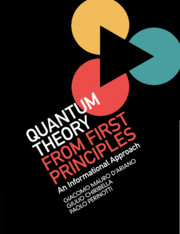Book contents
- Frontmatter
- Dedication
- Contents
- Preface
- Acknowledgments
- 1 Introduction
- Part I The Status Quo
- Part II The Informational Approach
- 3 The Framework
- 4 The New Principles
- 5 Causal Theories
- 6 Theories with Local Discriminability
- 7 The Purification Principle
- Part III Quantum InformationWithout Hilbert Spaces
- Part IV Quantum Theory from the Principles
- References
- Index
6 - Theories with Local Discriminability
from Part II - The Informational Approach
Published online by Cambridge University Press: 09 February 2017
- Frontmatter
- Dedication
- Contents
- Preface
- Acknowledgments
- 1 Introduction
- Part I The Status Quo
- Part II The Informational Approach
- 3 The Framework
- 4 The New Principles
- 5 Causal Theories
- 6 Theories with Local Discriminability
- 7 The Purification Principle
- Part III Quantum InformationWithout Hilbert Spaces
- Part IV Quantum Theory from the Principles
- References
- Index
Summary
In this chapter we introduce the principle of local discriminability, which stipulates the possibility of discriminating states of composite systems via local measurements on the component systems. The phenomenon of entanglement has relevant consequences on the accessibility of information in composite systems and on the complexity of characterization of transformations: local discriminability brings dramatic simplifications to the structure of the sets of states and transformations, reconciling the holism of entangled states with the reductionist scientific approach. In order to illustrate the structural relevance of the principle, we will briefly review some OPTs that do not satisfy it, contrasting the features of such theories with those of quantum and classical probabilistic theories, where the principle holds.
Entanglement and Holism
Holism is a widely known feature of quantum theory, related to the existence of entangled states. In quantum theory one has pure entangled states, whose marginal states are completely mixed. This situation corresponds to having maximal knowledge of the whole with minimal knowledge of the parts. The main manifestation of the holism of entanglement is the impossibility of reconciling the statistics of joint measurements on entangled states with local realism. Local realism is the assumption that any measurement on a system is just the reading of a pre-existing quantity encoded on the system. In other words, we cannot explain the statistics of measurements on the parts of a composite system as a manifestation of our ignorance of locally pre-existing values, as in classical OPT.
Does entanglement make information about composite systems locally unaccessible? This would pose severe practical issues on the possibility of acquiring information about physical systems. For example, suppose that two distant telescopes observe a source of entangled photons from a stellar emission. Holism would imply that some features of the emission process could never be detected, unless we are able to make the entangled photons interact in a joint measurement. On the other hand, if a reductionist approach is possible, local observations of the two photons at the sites of the two telescopes would be enough to characterize the emitting source. Thanks to the local discriminability principle, this is actually the case with entangled quantum sources.
Another consequence of holism is the fact that transformations generally cannot be characterized by local experiments, namely by applying the unknown transformation only to its input system.
- Type
- Chapter
- Information
- Quantum Theory from First PrinciplesAn Informational Approach, pp. 157 - 167Publisher: Cambridge University PressPrint publication year: 2017



